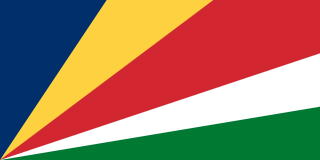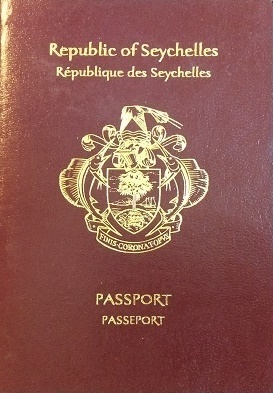 |
|---|
Parliamentary elections were held in the Seychelles in 1953.
 |
|---|
Parliamentary elections were held in the Seychelles in 1953.
The right to vote was granted to all citizens over the age of 21 who could write their name, paid income tax on an annual income of SR 3,000 or more, and could prove that they had lived in the Seychelles for at least a year. [1] Only around 10% of the population were able to register. [1]
All the seats were won by independents and members of the Seychelles Taxpayers and Producers Association, who primarily represented the interests of large landowners. [1] Voter turnout was only 36%. [1]

Seychelles, officially the Republic of Seychelles, is an island country and archipelagic state consisting of 115 islands in the Indian Ocean. Its capital and largest city, Victoria, is 1,500 kilometres east of mainland Africa. Nearby island countries and territories include the Comoros, Madagascar, Mauritius, and the French overseas departments of Mayotte and Réunion to the south; and Maldives and the Chagos Archipelago to the east. Seychelles is the smallest country in Africa as well as the least populated sovereign African country, with an estimated population of 100,600 in 2022.

The politics of Seychelles have historical roots in both one-party socialism and autocratic rule. Following independence from the United Kingdom in 1976, Seychelles was a sovereign republic until 1977, when the original President and leader of the Seychelles Democratic Party, James Mancham, was overthrown in a bloodless coup by the Prime Minister France-Albert René. René installed a single-party socialist state under the Seychelles People's Progressive Front in 1979 which remained in power until 1993, when multiparty elections took place for the first time since independence, after restoring the multi-party system in 1991. Modern day Seychelles governance takes place in a framework of a presidential republic, whereby the President of Seychelles is both head of state and head of government, and of a multi-party system. Executive power is exercised by the government. Legislative power is vested in both the government and the National Assembly.

The economy of Seychelles is based on fishing, tourism, processing of coconuts and vanilla, coir rope, boat building, printing, furniture and beverages. Agricultural products include cinnamon, sweet potatoes, cassava (tapioca), bananas, poultry and tuna.
A flat tax is a tax with a single rate on the taxable amount, after accounting for any deductions or exemptions from the tax base. It is not necessarily a fully proportional tax. Implementations are often progressive due to exemptions, or regressive in case of a maximum taxable amount. There are various tax systems that are labeled "flat tax" even though they are significantly different. The defining characteristic is the existence of only one tax rate other than zero, as opposed to multiple non-zero rates that vary depending on the amount subject to taxation.

France-Albert René was a Seychellois lawyer, politician and statesman who served as the second President of Seychelles from 1977 to 2004. He also served as the country's second Prime Minister from its independence in 1976 to 1977.

Wavel Ramkalawan is a Seychellois politician and Anglican priest who has been serving as the President of Seychelles since 26 October 2020. Ramkalawan was an opposition MP from 1993 to 2011 and 2016 to 2020. He also served as the Leader of the Opposition from 1998 to 2011 and 2016 to 2020. On 25 October 2020, Ramkalawan won the presidential election, the country's first such victory for an opposition candidate since independence, marking its first successful peaceful transition of power.

Franco-Seychellois are people of French descent living in the Seychelles. Franco-Seychellois have played an important role in the country's history both before and since independence.

Seychelles passports are issued to citizens of Seychelles to travel outside the country.

The history of Seychelles dates back to the fourth of the Portuguese India Armadas led by Vasco da Gama, though Seychelles was likely already known to Arab navigators and other sailors for many centuries. On 15 March 1503, the scrivener Thomé Lopes noted the sighting of an elevated island, doubtless one of the granitic islands and almost certainly Silhouette Island. The first recorded landing was by the men of the English East India Company ship Ascension, which arrived in Seychelles in January 1609.The islands were claimed by France in 1756. Seychelles remained uninhabited until the first settlers arrived on board the ship Thélemaque, which arrived on 27 August 1770. Captain Leblanc Lecore landed the first colonists, comprising 15 white men, eight Africans and five Indians. The Seychellois Creole language developed as a means of communication between the different races. The British frigate Orpheus commanded by Captain Henry Newcome arrived at Mahé on 16 May 1794. Terms of capitulation were drawn up and the next day Seychelles was surrendered to Britain. Following the fall of Mauritius to British forces, Captain Phillip Beaver of the Nisus arrived at Mahé on 23 April 1811 and took possession of Seychelles as a permanent colony of Britain. The Seychelles became an independent republic in 1976. Following a coup d'état, a socialist one-party state ruled the country from 1977 to 1993. The subsequent democratic Presidential elections were won by candidates of the same party.

The Seychelles made their Paralympic Games début at the 1992 Summer Paralympics in Barcelona, with just two representatives. Cyrl Charles competed in swimming, while Elvis Victor entered the shot put. Neither man won a medal. Cyrl Charles also competed in 2016, aged 53.

Parliamentary elections were held for the first in the Seychelles in October 1948. The Seychelles Taxpayers and Producers Association (STPA), which primarily represented the interests of large landowners, won all four seats.

Parliamentary elections were held in the Seychelles in 1951.

Parliamentary elections were held in the Seychelles in June 1957. The Seychelles Taxpayers and Producers Association (STPA) won three of the four seats.

The 1981 Seychelles coup d'état attempt, sometimes referred to as the Seychelles affair or Operation Angela, was a failed South African–orchestrated coup to overthrow the government of Prime Minister France-Albert René in Seychelles and restore the previous president, James Mancham, to power.

The 1977 Seychelles coup d'état was a virtually bloodless coup that occurred in the East African and Indian Ocean country of Seychelles on 4–5 June 1977. Between 60–200 supporters of the Seychelles People's United Party (SPUP), who had been training in Tanzania, overthrew President Sir James Mancham of the Seychelles Democratic Party (SDP) whilst he was attending the Commonwealth Heads of Government Meeting in London, the United Kingdom.
The COVID-19 pandemic in Seychelles was a part of the worldwide pandemic of coronavirus disease 2019 caused by severe acute respiratory syndrome coronavirus 2. The COVID-19 pandemic was confirmed to have reached Seychelles in March 2020.
Events in the year 2020 in Seychelles.
Capital punishment has been abolished in Seychelles. The country permanently abolished the death penalty by a Constitutional amendment in June 1993.

Seychellois nationality law is regulated by the Constitution of Seychelles, as amended; the Citizenship Act, and its revisions; and various international agreements to which the country is a signatory. These laws determine who is, or is eligible to be, a national of Seychelles. The legal means to acquire nationality, formal legal membership in a nation, differ from the domestic relationship of rights and obligations between a national and the nation, known as citizenship. Nationality describes the relationship of an individual to the state under international law, whereas citizenship is the domestic relationship of an individual within the nation. In Britain and thus the Commonwealth of Nations, though the terms are often used synonymously outside of law, they are governed by different statutes and regulated by different authorities. Seychellois nationality is typically obtained under the principal of jus sanguinis, i.e. by birth in Seychelles or abroad to parents with Seychellois nationality. It can be granted to persons with an affiliation to the country, or to a permanent resident who has lived in the country for a given period of time through naturalisation or registration.

The Seychelles Postal Service, is the public operator responsible for postal service in Seychelles.